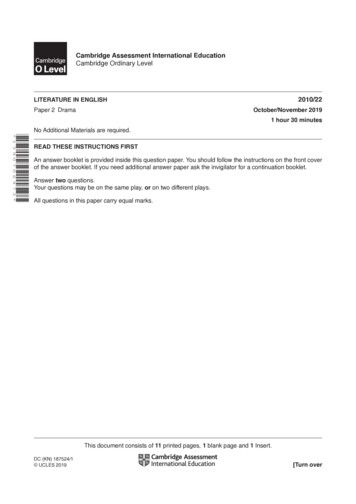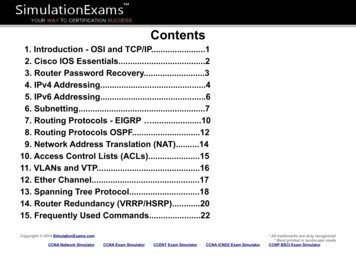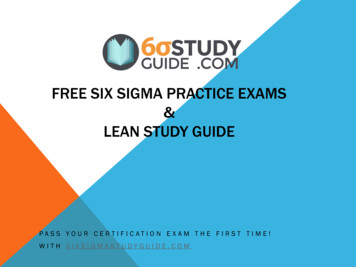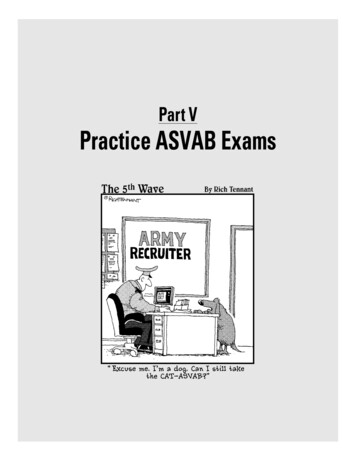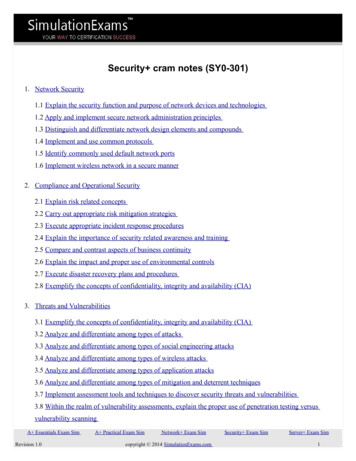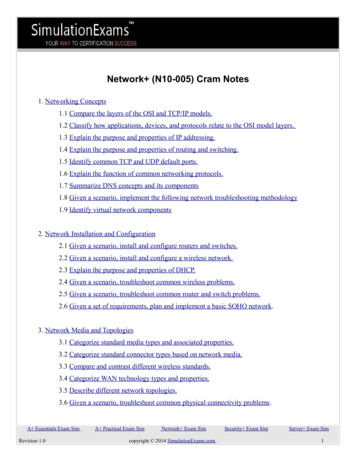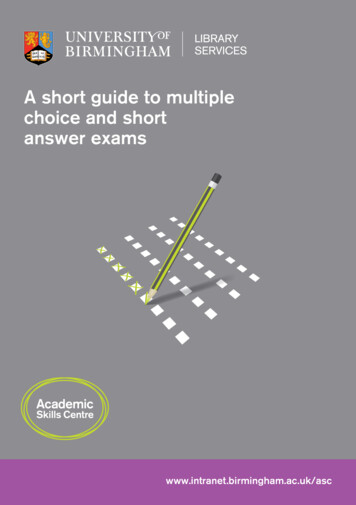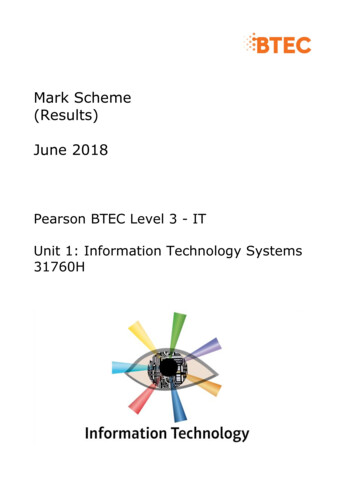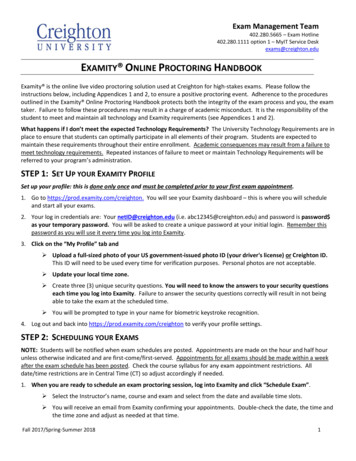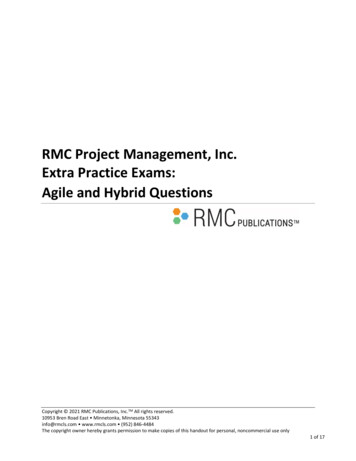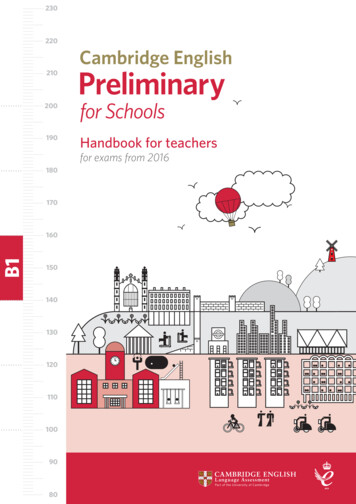
Transcription
B1230220210200190Handbook for teachersfor exams from 20161801701601501401301201101009080
Quick overviewWhat level is the exam?Cambridge English: Preliminary for Schools istargeted at Level B1, which is intermediate onthe CEFR scale. At this level users can:understand factual informationand show awareness of opinions,attitudes and mood in both spokenand written English.It can be used as proof of a candidate’s abilityto use English to communicate with nativespeakers for everyday purposes.PAPER 1: Reading and Writing1 hour 30 minsReading:Writing: FIVE PARTS, each with one or more texts and a setof questionsTHREE PARTS, including: Texts range from very short notices to longeradapted-authentic texts One communicative task of 35–45 words Covers a range of reading skills, from word up towhole-text levelPAPER 2: Listeningabout 36 mins One task focusing on vocabulary and grammar One longer piece (choice between an informalletter or a story) of about 100 wordsPAPER 3: Speaking10–12 minsFIVE PARTS, ingsrecordingsanda setaofandsetquestionsof questions FOUR PARTS, covering differentinteraction patterns Texts may be monologues or dialogues based onauthentic situations Tests are taken in pairs, or sometimes a groupof threeskills ona range of Covers a range of listening skills,includingeveryday topicsidentifyingkey information and identifying attitudeand opinion Includes answering short questions, speakingat length about a picture, discussing, expressingopinions and responding
Make the most of your handbookThe best way to get the most from your handbook is to use the digital version. Thedigital version is updated more regularly and includes an extra set of sample papers.The digital version contains links which take you straight to related pages if you wantto find out more. For example, you can read about Part 1 of the Reading and Writingpaper in the Tasks section, then click on the link to take you straight to a sample Part 1task. There are also links which take you to useful websites and resources.TasksThe Tasks pages give informationabout the exam format and what istested in each part of the paper.Preparing learnersThe Preparing learners pages giveinformation and advice about whatteachers can do to prepare theirlearners for the exam. There arealso links to useful websites to findadditional materials. You’ll findsuggested exam strategies to helplearners perform to the best of theirability on the day.Sample paper and assessmentThe Sample paper and assessmentsection includes a sample paper foreach of the four components as wellas an answer key for the Readingand Listening components. For theWriting and Speaking papers thereis information about the assessmentcriteria, and for Writing there areexample answers for you to refer to oruse with your learners.We want to hear from youContents2About the examPAPER 1:Reading and WritingTasksPreparing learnersSample paper and assessment7818PAPER 2:ListeningTasksPreparing learnersSample paper and assessment373844PAPER 3:SpeakingTasksPreparing learnersSample paper and assessment525358Language specifications66Glossary69Additional sample papers (digital version only)70We are keen to make this handbook asuseful as possible so please completeour online survey.Preliminary for Schools About the exam1
About Cambridge EnglishLanguage AssessmentCambridge English: Preliminary for Schools is developed byCambridge English Language Assessment, part of theUniversity of Cambridge.We are one of three major exam boards which form theCambridge Assessment Group (Cambridge Assessment).More than 8 million Cambridge Assessment exams aretaken in over 170 countries around the world every year.The world’s most valuable range ofEnglish qualificationsCambridge English Language Assessment offers the world’sleading range of qualifications for learners and teachers ofEnglish. Over 5 million Cambridge English exams are takeneach year in more than 130 countries.We offer assessments across the full spectrum of languageability – for general communication, and for professionaland academic purposes. All of our exams are aligned tothe principles and approach of the Common EuropeanFramework of Reference for Languages (CEFR).To find out more about Cambridge English exams and theCEFR, go toCambridge Assessment: the trading name for theUniversity of Cambridge Local Examinations Syndicate (UCLES)Proficient userA range of exams to meet different needsProficiency(CPE)C2Independent TS75Basic userDepartments of the UniversityCambridge Englishwww.cambridgeenglish.org/exams/cefrCommon European Framework of Reference (CEFR)One of the oldest universities in the worldand one of the largest in the United KingdomFirst(FCE) ary(PET) C)Flyers(YLE Flyers)Key (KET)for A1Movers(YLE Movers)A1Starters(YLE Starters)Departments (exam boards)Key features of Cambridge English examsCambridge English LanguageAssessmentCambridge English exams:Provider of the world’s mostvaluable range of qualifications forlearners and teachers of English are based on realistic tasks and situations – preparingfor their exam gives learners real-life language skills accurately and consistently test all four language skills –reading, writing, listening and speaking encourage positive learning experiences, andseek to achieve a positive impact on teachingwherever possible are as fair as possible to all candidates, whatever theirnational, ethnic and linguistic background, genderor disability.Cambridge InternationalExaminationsPrepares school students for life,helping them develop an informedcuriosity and a lasting passion forlearningOCR: Oxford Cambridge and RSAExaminationsOxford Cambridge and RSA2One of the UK’s leading providersof qualificationsPreliminary for Schools About the exam
Proven qualityWho recognises the exam?Our commitment to providing exams of the highest possiblequality is underpinned by an extensive programme ofresearch and evaluation. Question papers are produced andpretested using rigorous procedures to ensure accuracyand fairness, and the marking and grading of our exams iscontinuously monitored for consistency. More details canbe found in our publication Principles of Good Practice, whichcan be downloaded free fromThe Cambridge English: Preliminary certificate is recognisedaround the world as proof of intermediate level Englishskills for industrial, administrative and service-basedemployment. It is also accepted by a wide range ofeducational institutions for study purposes. The CambridgeEnglish range of exams is recognised by more than 20,000institutions and employers. For more information aboutrecognition go english.org/recognitionCambridge English: Preliminary forSchools – an overviewWhat level is the exam?Cambridge English: Preliminary for Schools is an Englishqualification at intermediate level.It was developed in 2008 as a version of Cambridge English:Preliminary with exam content and topics specificallytargeted at the interests and experience of schoolage learners.Cambridge English: Preliminary for Schools is targeted at LevelB1 on the CEFR.Achieving a certificate at this intermediate level proves thata candidate has mastered the basics in English and now haspractical language skills for everyday use.Cambridge English: Preliminary for Schools: follows the exam format and is at the same level asCambridge English: Preliminary leads to exactly the same internationally recognisedcertificate as Cambridge English: Preliminary matches students’ experiences and interests follows on as a progression from Cambridge English: Keyfor Schools enables students to take an internationally recognisedexam and enjoy the exam experience.Exam formatsCambridge English: Preliminary for Schools can be taken aseither a paper-based or computer-based exam.Who is the exam for?Cambridge English: Preliminary for Schools is aimed at schoolstudents who want to show they can: read simple textbooks and articles in English write letters and emails on everyday subjects understand factual information show awareness of opinions and mood in spoken andwritten English.Preliminary for Schools About the exam3
What can candidates do at Level B1?About the examThe Association of Language Testers in Europe (ALTE) hasresearched what language learners can typically do at eachCEFR level. They have described each level of ability usingCan Do statements, with examples taken from everydaylife. Cambridge English Language Assessment, as one of thefounding members of ALTE, uses this framework to ensureits exams reflect real-life language skills.Cambridge English: Preliminary for Schools is a rigorousand thorough test of English at Level B1. It covers all fourlanguage skills – reading, writing, listening and speaking.TypicalabilitiesReading and WritingListening and SpeakingOverallgeneralabilityCAN understand routineinformation and articles.CAN understandstraightforwardinstructions or publicannouncements.SocialandLeisureCAN write letters ormake notes on familiar orpredictable matters.CAN understandfactual articles inmagazines and lettersfrom friends expressingpersonal opinions.CAN write to his/herfriends about the books,music and films that he/she likes.SchoolandStudy4CAN express simpleopinions on abstract/cultural matters in alimited way.CAN identify themain points of TVprogrammes onfamiliar topics.CAN talk about thingssuch as films and musicand describe his/her reaction.CAN understand mostinformation of a factualnature in his/herschool subjects.CAN understandinstructions on classesand homework given bya teacher or lecturer.CAN write a descriptionof an event, for example aschool trip.CAN repeat back whatpeople say to check thathe/she has understood.CAN take basic notes ina lesson.CAN give detailedpractical instructions onhow to do somethinghe/she knows well.Preliminary for Schools About the examA thorough test of all areas of language abilityThere are three papers: detailed information on each testpaper is provided later in this handbook, but the overallfocus of each test is as follows:Reading and Writing: 1 hour 30 minutesCandidates need to be able to understand the mainpoints from signs, newspapers and magazines and usevocabulary and structure correctly.Listening: 30 minutes – approximatelyCandidates need to show they can follow andunderstand a range of spoken materials includingannouncements and discussions about everyday life.Speaking: 10–12 minutesCandidates take the Speaking test with anothercandidate or in a group of three. They are tested ontheir ability to take part in different types of interaction:with the examiner, with the other candidate andby themselves.Each of the three test components contributes to a profilewhich defines the candidates’ overall communicativelanguage ability at this level.Marks and resultsCambridge English: Preliminary for Schools gives detailed,meaningful results.
All candidates receive a Statement of Results. Candidateswhose performance ranges between CEFR Levels A2 and B2(Cambridge English Scale scores of 140–170) also receivea certificate.Distinction: Cambridge English Scale scores of 160–170Candidates sometimes show ability beyond Level B1. If acandidate achieves a Distinction in their exam, they willreceive the Preliminary English Test certificate statingthat they demonstrated ability at Level B2.Pass and Pass with Merit: Cambridge English Scalescores of 140–159If a candidate achieves a Pass or Pass with Merit in theirexam, they will receive the Preliminary English Testcertificate at Level B1.CEFR Level A2: Cambridge English Scale scores of120‑139If a candidate’s performance is below Level B1, but fallswithin Level A2, they will receive a Cambridge Englishcertificate stating that they demonstrated ability atLevel A2.Cambridge English Entry Level Certificate inESOL International (Entry 3) (Preliminary)*This is to certify thatAN EXAMPLEhas been awardedPass with Meritin thePreliminary English TestCouncil of Europe Level B1Overall Score 156Reading160Writing150Listening155Speaking158Date of Examination FEBRUARY 2016Place of EntryCAMBRIDGEReference Number15BGB9615003Accreditation Number 500/2414/0Statements of ResultsThe Statement of Results shows the candidate’s:Saul NasséChief Executive*This level refers to the UK National Qualifications FrameworkDate of issue 25/03/16Certificate number 0044441108 Score on the Cambridge English Scale for theirperformance in each of the four language skills(reading, writing, listening and speaking). Score on the Cambridge English Scale for their overallperformance in the exam. This overall score is theaverage of their scores for the four skills. Grade. This is based on the candidate’s overall score. Level on the CEFR. This is also based on theoverall score.CertificatesThe certificate shows the candidate’s: score on the Cambridge English Scale for each of thefour skills overall score on the Cambridge English Scale grade level on the CEFR level on the UK National Qualifications Framework(NQF).Special circumstancesCambridge English exams are designed to be fair to all testtakers. For more information about special circumstances,go towww.cambridgeenglish.org/helpExam supportOfficial Cambridge English exampreparation materialsTo support teachers and help learners prepare for theirexams, Cambridge English Language Assessment andCambridge University Press have developed a range ofofficial support materials including coursebooks andpractice tests. These official materials are available in bothprint and digital tudents will receive the same certificate as candidates whotake Cambridge English: Preliminary.Preliminary for Schools About the exam5
Support for teachersRegistering candidates for an examThe Teaching English section of our website provides userfriendly, free resources for all teachers preparing for ourexams. It includes:Exam entries must be made through an authorisedCambridge English examination centre.General information – handbooks for teachers,sample papers. details of entry procedures copies of the exam regulations exam dates current feesDownloadable lessons – a lesson for every part ofevery paper. more information about Cambridge English: Preliminaryfor Schools and other Cambridge English exams.Teaching qualifications – a comprehensive range ofqualifications for new teachers and career developmentfor more experienced teachers.We have more than 2,800 centres in over 130 countries– all are required to meet our high standards of examadministration, integrity, security and customer service. Findyour nearest centre atSeminars and webinars – a wide range of exam-specificseminars and live and recorded webinars for both newand experienced iled exam information – format, timing, number ofquestions, task types, mark scheme of each paper.Advice for teachers – developing students’ skills andpreparing them for the exam.Teacher development – resources to support teachersin their Continuing Professional ishSupport for candidatesWe provide learners with a wealth of exam resources andpreparation materials throughout our website, includingexam advice, sample papers, candidate guides, games andonline learning hFacebookLearners joining our lively Facebook community canget tips, take part in quizzes and talk to other Englishlanguage learners.www.facebook.com/CambridgeEnglish6Centre staff have all the latest information about our exams,and can provide you with:Preliminary for Schools About the examFurther informationIf your local authorised exam centre is unable to answeryour question, please contact our helpdesk:www.cambridgeenglish.org/help
PAPER 1:Reading and Writing1 hour 30 minsTasksNumber ofquestionsNumber ofmarks152ReadingPartTask typeWhat do candidates have to do?53-optionmultiple choiceRead five real-world notices,messages and other short texts for themain message.55MatchingMatch five descriptions of people toeight short texts on a particular topic,showing detailed comprehension.31010True/falseScan a longer factual text forspecific information.4554-optionmultiple choiceRead a longer text for detailedcomprehension, gist, inference andglobal meaning; as well as writer’sattitude, opinion and purpose.510104-option multiplechoice clozeRead a factual or narrative text andchoose the correct vocabulary andgrammatical items to complete gaps.3535 (weightedto 25)155SentencetransformationsComplete sentences to rewrite fiveoriginal sentences so that the meaningis the same, but a different structuralpattern is used. They must use no morethan three words to complete theirsentences.215Shortcommunicativemessage, e.g.postcard, email,note etc.Write between 35 and 45 words,communicating three content pointsgiven in the task.3120 (weightedto 15)Choice betweenan informal letteror a storyWrite about 100 words, answering thequestion of their choosing. Candidatesare assessed using four subscales:Content, Communicative Achievement,Organisation and ritingwriting Tasks7
Preparing learnersAdvice for teachersWe make every effort to ensure that all texts are accessible worldwide and areinteresting to young people aged between 11 and 14.Parents can getmore informationfrom the Informationfor parents pageon the CambridgeEnglish website.Writers use the grammatical syllabus and the vocabulary list when preparingtasks so they are suitable for learners at B1 level, the level of Cambridge English:Preliminary for Schools.Whenever possible, the texts used in the Reading paper are adapted fromauthentic reading texts. They may include: notices and signs (Part 1) packaging information (Part 1) notes, emails, cards, text messages, postcards (all Reading and Writing tasks) newspapers and magazines (Parts 2, 3, 4) simplified encyclopaedias and other non-fiction books (Parts 3, 5) brochures and leaflets (Parts 2, 3) websites (Parts 1, 2, 3, 4, 5).Learners can getmore informationfrom the Informationfor candidates guide.Teachers may need to adapt texts to make them suitable for B1-level learners.The vocabulary list and the language specifications can help teachers to identifysuitable language areas. The vocabulary list is updated annually.Teachers can findlesson plans andsample papers onthe CambridgeEnglish website.noticeReading Part 1Teen MagazinesQuestions 1 – 5ALook at the text in each question.What does it say?Mark the correct letter A, B or C on your answer sheet.Example:0BTeens Now is a successful musicmagazine for teenagers that listswho is playing, where and whenand how to get tickets.Interviews with well-knownsingers and groups as well asdetailed biographies areincluded. It also gives its readersthe chance to send in their ownarticles.DSome leading journalists write forTeen People, a music magazineaimed at the teen market. There areinterviews with new bands as well asthe latest news on recordings, toursand festivals. A popular feature isthe annual reader’s vote for the bestnew band.The advert says the computer gameFOR SALEA is almost new and in good condition.NS Teens magazine is well-knownCfor its wildlife and environmentalB does not work on the seller’scomputer.contentbut it also has articles onthe history and culture of peoplefrom around the world. Some ofthe articlesC is only suitable for youngerplayers. are long and detailedbut the magazine is also famous forits fantastic photo-journalism.There are also letters from readersas well as maps and fact sheets.Rainforest Computer Game2–4 playersBought last monthPlayed once – worksperfectlyPhone Tom: 255324Answer:Youth World is an entertainmentmagazine full of ideas on what to do.It provides details of all the latestfilms, concerts, exhibitions andfashion shows. If you are someonewho prefers to stay in, it alsorecommends the best DVDs towatch.0ABC1Top Teens is easy to read and full ofEWhat should Peter do? colour photographs. There are arange of different sections includingoffering fashion and beautyA let Stefan know if he is thosedelayedadvice. But the majority of its pagesare devoted to interviews with thewell-knownstars of cinema,B tell Stefan which film hepopular,wants towatchmusic and sport.FThe only environmental magazinewritten by teenagers for teenagersis Young WB. Readers are invitedto send their articles andphotographs to the magazine’soffices and material is chosen forthe next issue. As well as articlesabout the natural world, themagazine also has many specialoffers and competitions.Teenplus is very different from theGaverage teen magazine that simply offersarticles on pop stars and fashion. Thisexciting new magazine informs readersA Lina would like to know if Natasha is going toabout what is happening in the worlddo her history homeworklater thisevening.throughits in-deptharticles on currentHNo journalists write forTeen Voice. Thismagazine dependscompletely on articlessent in by its teenagereaders. It gives youngpeople the opportunity topublish their creativework, such as poems orshort works of fiction orto voice their opinionson important issues.They can also writereviews of the latestmusic CDs.C wait for Stefan inside the cinema2affairs, politics and science. It alsooffers a variety of reviews on recentB Lina wants to compare thenotesshebooks,filmsandwrotemusic CDs.about the history homework with Natasha’s.C Lina hopes she can look at the informationNatasha has for the history homework.2text message8Reading and Writing Preparing learners5magazines
PAPER 1Tips for preparing learners for theReading component99 Give learners a wide range of text types to read,both authentic and adapted. For example, notes andmessages on social media websites, informationleaflets, graded readers and articles.99 Help learners practise skimming and scanning bothshorter and longer texts. Encourage learners todevelop a habit of always skimming a text first to get ageneral understanding.99 Give learners practice reading texts with unfamiliarvocabulary, learning to ignore words which are notimportant for the task.99 Encourage your learners to read instructions carefully.Ask them to highlight key words, and use examples tohelp them understand what to do.99 Give learners practice doing timed exercises and examtasks where they need to manage their own time in theReading and Writing paper. Suggest that they spendabout 50 minutes on the Reading component (leavingabout 40 minutes for the Writing component).99 Help learners think about the different ways they readtexts. For example, if they are reading an informationleaflet then ask them to find some specific information.If they are reading a message, ask them to think howthey would reply to it.99 Help your learners to work out the meaning of newwords by using the rest of the text. Encourage them notto use a dictionary for every new word.Completingthe answer sheet (paper-based test only) All answers must go on an answer sheet. Candidates should use a pencil to complete theanswer sheet. There is no additional time allowed for completingthe answer sheet: candidates must do this withinthe 1 hour 30 minutes allowed for the test. For the Reading component, candidates shade alozenge on the answer sheet to show their answer. For the Writing component, candidates write theiranswers on the correct part of the answer sheet.Completingthe computer-based test (computer-based test only) All answers are typed directly onto the computer. Candidates may take pens and pencils and a bottleof water into the exam room, but nothing else(including bags and anything electronic). Candidates should listen carefully to theinstructions which the invigilator gives and followthe instructions on the computer screen. There are no examples in the Reading component,but candidates watch a short tutorial beforethe test. There is a timer on the screen which tellscandidates how much time they have left. Candidates may make notes on paper during theexam, for example if they want to plan an answerfor the Writing component. They must leave thesenotes on their desk at the end of the exam.Reading and Writing Preparing learners9
Quick links to resourcesParents Information for parents Information for candidates hools/preparation Vocabulary list Free teaching ources-forteachers Lesson rationTeachersLanguage specifications: Page 66Topics list: Page 6810Reading and Writing Preparing learners
PAPER 1Advice by taskCandidates should practise these exam strategies regularly in class.See these tasks in full from page 18.Reading Part 1Reading Part 1Questions 1 – 5Look at the text in each question.What does it say?Mark the correct letter A, B or C on your answer sheet.Example:0ww In this part, candidates have five short texts. With each text is onemultiple-choice question with three options A, B and C.The advert says the computer gameFOR SALEA is almost new and in good condition.Rainforest Computer Game2–4 playersBought last monthPlayed once – worksperfectlyPhone Tom: 255324Answer:THE TASK0ABHOW TO APPROACH THE TASKB does not work on the seller’s computer.C is only suitable for younger players.C1What should Peter do?A let Stefan know if he is delayedB tell Stefan which film he wants to watchC wait for Stefan inside the cinema2A Lina would like to know if Natasha is going todo her history homework later this evening.B Lina wants to compare the notes she wroteabout the history homework with Natasha’s.C Lina hopes she can look at the informationNatasha has for the history homework.ww Candidates should read the text and decide what situation it wouldappear in.ww They can use the visual information (layout, location etc.) to helpidentify the context.ww Next they should read the three options.ww Candidates then need to compare each option with the text beforechoosing an answer.ww Explain that it is important to read the chosen option again to checkthat the meanings match.ASSESSMENTww This part tests the candidate’s understanding of various kinds ofshort texts.2Reading Part 2Reading Part 2Questions 6 – 10The teenagers below are all looking for a magazine to read.On the opposite page there are descriptions of eight magazines for young people.Decide which magazine would be the most suitable for the following teenagers.For questions 6-10, mark the correct letter (A-H) on your answer sheet.6Olaf would like to read stories that people his own age havewritten. He is also keen on music and would like somerecommendations on the best bands to listen to.THE TASKww Candidates have five short descriptions of people and have to matchthis content to five of eight short texts on a particular topic.HOW TO APPROACH THE TASKww Candidates should begin by reading the five descriptions ofthe people.7Becca wants to know more about the lives of famous peoplewho frequently appear in the news. She is also interested inclothes and would like recommendations on what to wear.8Hiro is interested in learning more about the latest internationalevents. He is also keen on the cinema and would like to readdifferent opinions on what to see.ww Candidates should then compare the description again with anypossible matches. They need to check that the text meets all therequirements of the description.9Gina is interested in geography and the natural world. Shewould also like to read articles that tell her about the lives ofpeople from other countries.ww They should avoid using one or two identical words in the descriptionand the text to choose an answer (‘word-spotting’). Instead they needto focus on the meaning of the whole text.10Chris enjoys going to concerts and wants to find out more aboutthe people in his favourite bands. He is also keen to readarticles written by other teenagers.ww Next, they need to read all eight texts carefully, underlining anymatches between these and anything in the descriptions of the people.ASSESSMENTww This part tests the candidate’s detailed comprehension offactual material.4Reading and Writing Preparing learners11
Reading Part 3Reading Part 3Questions 11 – 20Look at the sentences below about a comedy club for young people, called Comedy Kids.Read the text on the opposite page to decide if each sentence is correct or incorrect.If it is correct, mark A on your answer sheet.If it is not correct, mark B on your answer sheet.11Comedy Kids operates a number of internationally-based clubs for young people.12Comedy Kids comedians have had as much experience working with children as with adults.13According to John Winterton, he is the first ever young people’s stand-up comedian.14John looks like most people’s idea of a typical entertainer for young people.15Comedy Kids will hold special parties at their clubs for young people if requested.16A lot of Comedy Kids comedians have the right qualities for performing at young people’sparties.17Guests at Comedy Kids parties are invited to perform if they wish.18Comedy Kids have discovered lots of good young comedians who have not been trained.19In a year’s time there’ll be more classes available for young people wanting to be comedians.20Comedy Kids prefer it if the young people who join them are already quite confident.THE TASKww There are 10 questions, which are single-sentence statements about alonger factual text.HOW TO APPROACH THE TASKww Candidates should first read the questions, which are singlesentence statements.ww Next, they need to scan the text to fin
The best way to get the most from your handbook is to use the digital version. The digital version is updated more regularly and includes an extra set of sample papers. The digital version contains links which take you straight to related pages if you want to find out more. For exam
